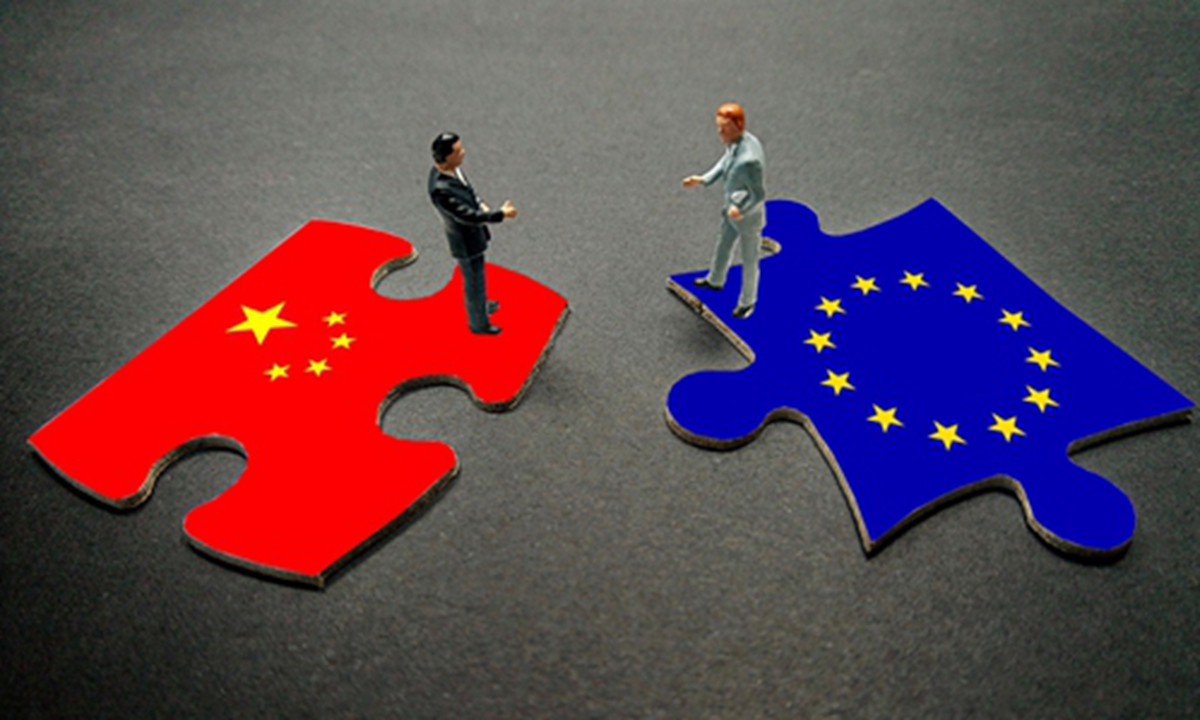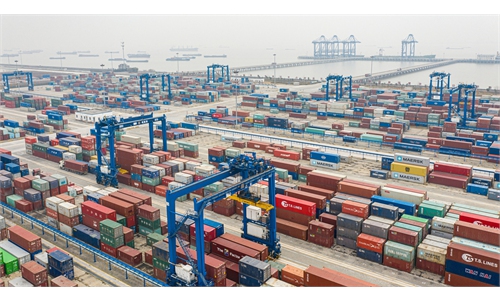Biz Quick Take: Here is why China-Europe cooperation cannot and should not be derailed

Photo: VCG
China-Europe relations had some tough times in 2021 due to sanctions and Lithuania's blunder over the Taiwan question. Some have even argued that 2021 was the most difficult year for China-Europe ties since 1989. And yet, economic and trade ties between the two sides remain strong and continue to expand in the face of complex geopolitics and rising tensions.
In the first two months of 2022, the EU surpassed ASEAN to become China's biggest trading partner after losing the spot in 2021. Between January and February, China-EU trade increased by 12.4 percent year-on-year to 874.64 billion yuan ($138.54 billion), while China-ASEAN trade expanded by 10.5 percent on the same period to 870.47 billion yuan.
That comes on the heels of solid trade in 2021. In spite of a slew of challenges, ranging from the COVID-19 pandemic and tensions over certain issues, China-EU bilateral trade reached a historic high in 2021, exceeding the $800 billion mark. China remained the EU's biggest trading partner as well.
Adding to the positive picture, two-way investment between China and the EU reached $270 billion. European businesses, are very active in various sectors of the Chinese market, including financing, new energy, electric cars and logistics. Another key barometer of China-EU trade is the number of China-Europe freight trains, which reached 15,000 in 2021, up 22 percent year-on-year. In a recent survey by the European Chamber of Commerce in China, 60 percent of firms surveyed plan to expand their China operations, while nearly half said that their profits from the Chinese market are higher than the global average.
These are solid figures that speak to the robust economic ties between China and Europe. They are particularly significant considering the rising challenges and hurdles posed by the COVID-19 pandemic and diplomatic tensions following a series of moves by European officials, including freezing the ratification of the massive China-EU Comprehensive Agreement on Investment (CAI). The EU has also repeatedly accused China, without concrete evidence, of "economic coercion" against Lithuania and has even moved to file a case against China at the WTO.
It has become very clear by now that some forces, both inside and outside the EU, are working to undermine China-Europe relations despite the massive economic and trade interests shared between the two sides. This sabotage campaign has been laid bare after US President Joe Biden took over the White House, which has made it abundantly clear that it does not want to see close ties between China and the EU, or between China and any other country, for that matter.
Still, as the data show, that sabotage campaign has, at least for now, failed to drag down bilateral economic and trade cooperation. That should say something about the win-win nature of China-Europe ties. Europeans, especially those who are pushing anti-China agendas, should be aware of this: China-Europe cooperation is based on mutual benefit and mutual respect and seeking to cut ties or crack down on China is not in Europe's best interest.
This should not be hard for any reasonable and fair person to understand. However, there are some in Europe who are turning a blind eye to this and seek to escalate tensions with China. Even as Europe is being consumed by the Russia-Ukraine conflict, some have not spared efforts to slander China and drive a wedge between China and Europe over the response to the Ukraine crisis. A recent article in The Diplomat asserted that the Russia-Ukraine conflict will further fray China-Europe relations, predicting that 2022 will be even worse for bilateral relations.
Such claims are ominous but unfortunately they are not entirely unfounded. If both sides, particularly European officials, fail to improve communication to address differences while focusing on the shared interests, things could become much more complex and delicate, as many anti-China forces within Europe and beyond will undoubtedly step up their sabotage campaign against China-Europe relations.
As Chinese State Councilor and Foreign Minister Wang Yi pointed out on Monday, there are still some forces who do not want to see the stable development of China-EU relations, fabricating the so-called "China threat," hyping up competition with China, advocating "institutional rivals", and even provoking sanctions and confrontation.
"I hope that both China and the EU will be highly vigilant about this," Wang said during a press conference when asked whether the Russia-Ukraine conflict would affect China-Europe relations.



